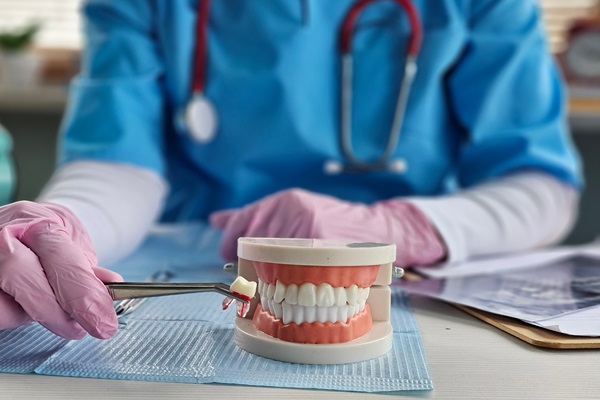Can a Cracked Tooth be Saved with a Root Canal and Crown Hamilton, OH
When you crack a tooth, there are multiple tools and techniques to repair the damage. However, there is one option that stands above the rest: the dental crown. A crown is a cap, typically consisting of porcelain that matches the shape and size of the tooth. The crown acts as a strong cover that protects the tooth from infection and losing the tooth.
Without the crown, the tooth will not even be able to handle the pressure of chewing. It is important to treat a cracked tooth as soon as possible by seeking treatment from a professional endodontist.
Symptoms of a cracked tooth
To understand the symptoms of a cracked tooth, it is crucial to understand that the teeth have layers. The outer layer is known as the enamel, followed by the dentin and then the pulp. The dental pulp contains the nerves and blood vessels. If the pulp begins to move around or the crack is severe enough to damage the pulp, you will begin to feel intense pain. Symptoms of a crack in a tooth:
- Erratic pain resulting from chewing
- Pain when releasing biting pressure
- Pain from consuming something hot or cold
- Inconsistent pain that seems to come and go with certain actions
- Difficulty finding the tooth that is causing the discomfort
Since it can be difficult to identify the source of the pain beyond the teeth, we recommend scheduling an appointment as soon as possible. When one cracks the outer layer of the tooth, there is a possibility of the inner parts of the tooth moving around and causing irritation. In other cases, the crack can be deep enough that an infection forms in the dental pulp.
Without specialized treatment, the infection will spread to the bones and surrounding gums, causing a specialist to have to consider extracting teeth in serious cases. Fortunately, you can avoid all of those issues by seeking professional treatment from an endodontist. If you seek treatment to repair a tooth before the crack allows an infection into the tooth, then a dental crown will be the most effective fix.
The dental crown process
By customizing the crown, the endodontist can ensure that the crown fits properly on the tooth and the surrounding teeth. Not only will the crown protect the tooth, it will also have the appearance of a natural tooth. This way, people will not be able to notice that it is artificial in the first place. In order to place a dental crown, the patient will have to make at least two appointments.
During the first appointment, we will take measurements and a mold of the tooth. In some cases, the endodontist may need to remove a bit more of the tooth to place the crown. However, it may be better to place the crown without altering the tooth further. If the endodontist offers Same-Day Dentistry, then you will be able to get the crown that day. Otherwise, a dental lab will then customize the crown to the exact specifications of the mold. Once the crown is complete, the patient will return for a second appointment to place the crown.
The endodontist will place the crown and cement it in place. This way, the patient will be able to eat and use the tooth without worry. Contrary to popular belief, you will not need to stop eating your favorite foods with a dental crown. However, you may need to come in for some maintenance every few years.
Check out what others are saying about our dental services on Yelp: Can a Cracked Tooth be Saved with a Root Canal and Crown Hamilton
Taking care of a dental crown
Since a dental crown is artificial, you will not need to worry about the crown becoming infected. However, you will need to continue cleaning the teeth and gums, being sure to keep any food from sticking to the crown. It is also beneficial to avoid biting down directly on anything that is too hard and avoid causing other damage.
By having an endodontist repair your tooth, you will not have to worry about the dental crown falling out or becoming loose. A dental crown is an effective solution to repair the cracked tooth in most cases. However, if a more invasive procedure is necessary, then an endodontist is the best place to be.
If you are struggling with a chipped or cracked tooth, do not hesitate to call today. It is crucial to seek professional treatment as soon as possible. Thanks to the easy level of care a dental crown requires, few people experience any difficulties with their dental crowns. Seek treatment today to save your tooth tomorrow.
If you live in the Hamilton area, call (513) 712-9642 to schedule your dental exam so that you can remain in good health or receive treatment for a current condition.
Questions Answered on This Page
Q. What are the symptoms of a cracked tooth?
Q. How can a dental crown treat my cracked tooth?
Q. How do I take care of a dental crown?
People Also Ask
Definition of Endodontic Terminology
- Cementum
- Cementum is that bone-like tissue that forms the outer surface on the root of the tooth.
- Dental Pulp
- Dental pulp is the inner-most layer of the tooth with connective tissue that contains blood vessels and nerve tissue.
- Dentin
- Dentin is the inner layer of the tooth structure that is immediately under the enamel and surrounds the dental pulp.
- Direct Pulp Cap
- A direct pulp cap is a procedure in which a professional treats exposed pulp with a therapeutic material to help the tooth heal.
- Enamel
- The enamel is the hard calcified layer that covers the entire tooth and is subject to interaction with multiple substances.
- Endodontist
- An endodontist is a specialist who focuses on treating issues, diseases and conditions that affect the inner-most layer of the tooth, the dental pulp.
- Pulpectomy
- A pulpectomy is a procedure that involves the complete removal of pulp tissue from the root canal in a tooth.
- Pulpitis
- Pulpitis is another term to describe the inflammation of the dental pulp due to an injury or infection.
- Pulpotomy
- A pulpotomy is a procedure involving the removal of a portion of diseased or infected pulp in order to protect the healthy portions of the pulp and teeth still in the mouth.
Back to top of Can a Cracked Tooth be Saved with a Root Canal and Crown




